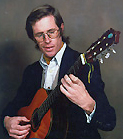 Hannemann’s Music Corner
Hannemann’s Music CornerWelcome to a variety of columns on Music. Not entertainment, nor Happenings, nor Events, but Music.
Some columns are answers to questions people ask, and I invite you to add fuel to the fire by firing off any questions you may have.
Topics will cover the full spectrum: music history, music theory, music as a business, music performance, instrument playing tips.
Some will be short, some not so. Some will have notation (so early on will be some columns about reading notation.)
First up: Practice.
I am absurdly ADHD, which means concepts like “discipline” and “focus” are not in my repertoire. But I did manage to build a repertoire and that came from practice, and rehearsal, and just playing (in every sense of that term.)
Students, and parents thereof, always ask, “how long should a practice session be?” Simple answer: when you start balancing the checkbook in your head its time to go do something else.
However, just because you stop for the nonce doesn’t preclude you from going back to it later. Like 10 minutes later.
This is where an instrument stand comes in handy (warning: do not use in a room where there is a dog with a large tail.)
Set your instrument on its stand and see how long you can remain in the same room and ignore it – as it stares at you.
Forlornly. It wants to be played and it will demand your attention. An unresolved minor 2nd is easier to live with.
How long do you practice/rehearse/play? Okay – 5 minutes of attentive, purposeful, practice will accomplish more than half an hour of going through the motions.
Which means play as long as you can be attentive and purposeful in your efforts.
Purposeful means knowing what you want to accomplish before you even pick up the instrument. Maybe you have a measure, or a phrase, in a piece which is being difficult.
Maybe there is a new technique or fingering you want to experiment with. What ever the reason for picking up the instrument have a reason to pick up the instrument.
When you’ve accomplished the objective go do something else. Come back later with a new objective.
Attentive involves a little bio-feedback. Think – really THINK – about what you are hearing; think about what the music is doing; think about, and feel, what your fingers are doing and how your fingers feel; think about everything involved in playing and let everything involved in playing – your body and the music – instruct you in the fine art of making music.
Remember the Music Man and “think-ology”? Yeah, there really is something to that.
When do you practice? First and foremost, whenever the fit strikes you. Beyond that, something that is schedule-ish helps.
If you are taking private lessons you should always do a practice session as soon after your lesson as possible to re-enforce what you learned that day.
Yes, you want to play every day – but maybe not at the same time daily or for the same amount of time each day.
For instance, Wednesday might be 7:30 a.m. for a quick session, Thursday might be during lunch, medium session, Friday might be having a really long session instead of going to the pub after work.
But every Wednesday should be the same, as well as every Thursday, Friday, etc. None of which precludes you from picking it up for a few minutes while dinner is cooking or anytime you have 5 minutes doing nothing.
And as much as possible, try to always spend a few minutes with your instrument just before you go to bed.
In dreams we work out many of our difficulties and if you dream about the music you are trying to play you will find that come morning it will be a lot easier to play it.
Where should you practice? Were ever the fit strikes you. Barring that, it is helpful to have a space which is exclusively your “music space.”
This is where you do music, where you play music, where you think music – and only music. Perhaps you use a special chair – your music chair.
This really works. George Bernard Shaw always did his writing with his feet in a bucket of cold water – it established a mood, a mind-set, and released the brain’s alpha waves of creativity.
Finally, when you have finished a session reward yourself by noodling. We’ll get to what that is later.
Play on, people.

